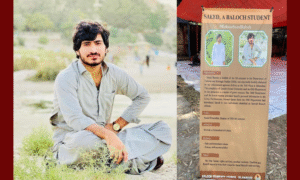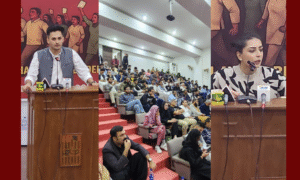Taqveem Warraich
What was once impossible appears to be a new reality today. Man has always been in a state of war against nature and has seemingly evolved and helped in making this world more liveable than before. Pandemics or any other calamity is merely an opportunity for humans to respond and reflect on new challenges and showcase their abilities to cope. The world is now shifting towards a ‘new normal’ and, of course, the transformation is not devoid of pits and potholes.
Be it an unusual situation or not, it is no secret that the educational system in Pakistan has always been in shambles. Despite the tall claims of governments regarding improvements, lack of educational institutes, low budget allocation, and inept infrastructure has existed since long ago and resultantly there are millions of students who are unable to acquire education. However, this write-up would focus only on the online education system of public sector universities, the problems within, and a viable solution.
Pakistan has not been developed harmoniously. One observes a clear ‘educational apartheid’ on a regional basis. With a total of 67 public universities in Pakistan, Punjab has most in number. For that matter, many have to travel hundreds of kilometres far from their homes to get enrolled in the universities. The problem is not just about universities but holistically whole regions are left under-developed, devoid of basic necessities such as internet connectivity.
It is important to consider that most students who come to the public sector are from modest socioeconomic backgrounds and many cannot afford to buy smartphones or laptops. Also, it is a dilemma of Pakistan when the world is struggling for 5G technologies; hardly is there any access to 3G and 4G networking in several areas of K.P., Baluchistan, ex-FATA and G.B. It has resulted in it being expensive and thus reducing affordability. So, online education has turned out to be a problem for many rather than a way forward.
The role of the state in education cannot be ignored as the constitution of Pakistan declares it to be the responsibility of the state, which asserts: ‘The state shall promote, with special care, the educational and economic interests of backward classes or areas.’ But, the state has clearly shied away from its responsibility and has left the room empty for private investors.
In the wake of neoliberalism, the call of free trade which supports the notions of privatization has enabled many private investors to build educational institutes. The competition among private institutes provides the students with latest technology and better infrastructure. It then becomes quite intriguing to know that COVID-19 has been a challenge for all at equal footing but the private sector has been very quick and efficient in adapting to online systems, whereas, the public sector has failed to do so. The reason which indicates the problem is that the public sector has neither relied on computerized systems ever, even for conduction of routine affairs, for instance, submission of fee challans nor has it invested in technological developments.
Other major chunk of problem is on the part of teaching staff. Mostly faculty is aged and have not spent their early ages in times of technological boom. Obviously, it does not mean that they cannot be trained but a few hurdles need to be repealed. Firstly, the institutions exclusively for teacher education must be established. Secondly, the already practiced training workshops which offer a stereotyped version of teacher’s education, devoid of critical thinking and awareness of upcoming challenges, needs to be revisited.
A phenomenon is generally practiced in educational institutes what Paulo Freire calls the ‘banking concepts of knowledge’ where students sit back, teachers transmit information, and students reproduce this information in the examination paper and secure good grades. In the online education system, the lectures are conducted either through recorded voice notes or video lectures which reduce the intractability significantly. This process of teaching and learning is defective in essence and becomes even more futile when practiced in online education.
This problem of interaction is not exclusive to online education but generally, the attitude of teachers, as they consider themselves to be government servants, towards students is of master and subject. The essentiality of teacher student cooperation is near to absent in public sector institutes. Moreover, the assessment policy devised by universities is not to make students learn and grow rather type and pass.
One of the critiques on online education is that university campuses are not only a place to study syllabus but also where students learn while interacting with people due to on-campus diverse environment. It is considered to be a miniature of a society, where students have opportunities to learn and practice the skills. This critique sounds logical but at times when the campus is inoperable, there comes the utmost need to shift to online systems. No one can predict when this pandemic would erode or when would next one come, but Pakistan is a country where unfortunate events like blasts and protests, take place on and off and campuses are forced to close. For the sake of an alternative, online systems must be devised and ready to rely upon.
There is not a pinch of doubt that ‘online education’ is the future but to make it effective and productive in real sense aforementioned problems must be eradicated with utmost priority. This is the only way to shatter Pakistan’s fossilised, white elephantine education system and replace it with a new, reformed model congruent with the demands of the world. Pakistan needs a system of education which finally enables students to learn, and teachers to teach so that a dream of better educated and more prosperous Pakistan never dies.
The writer is a student of political science at Government College University.
The Students’ Herald News Desk focuses on reporting the latest news regarding student politics and campus updates to you.
The News Desk can be reached at admin@thestudentsherald.com




